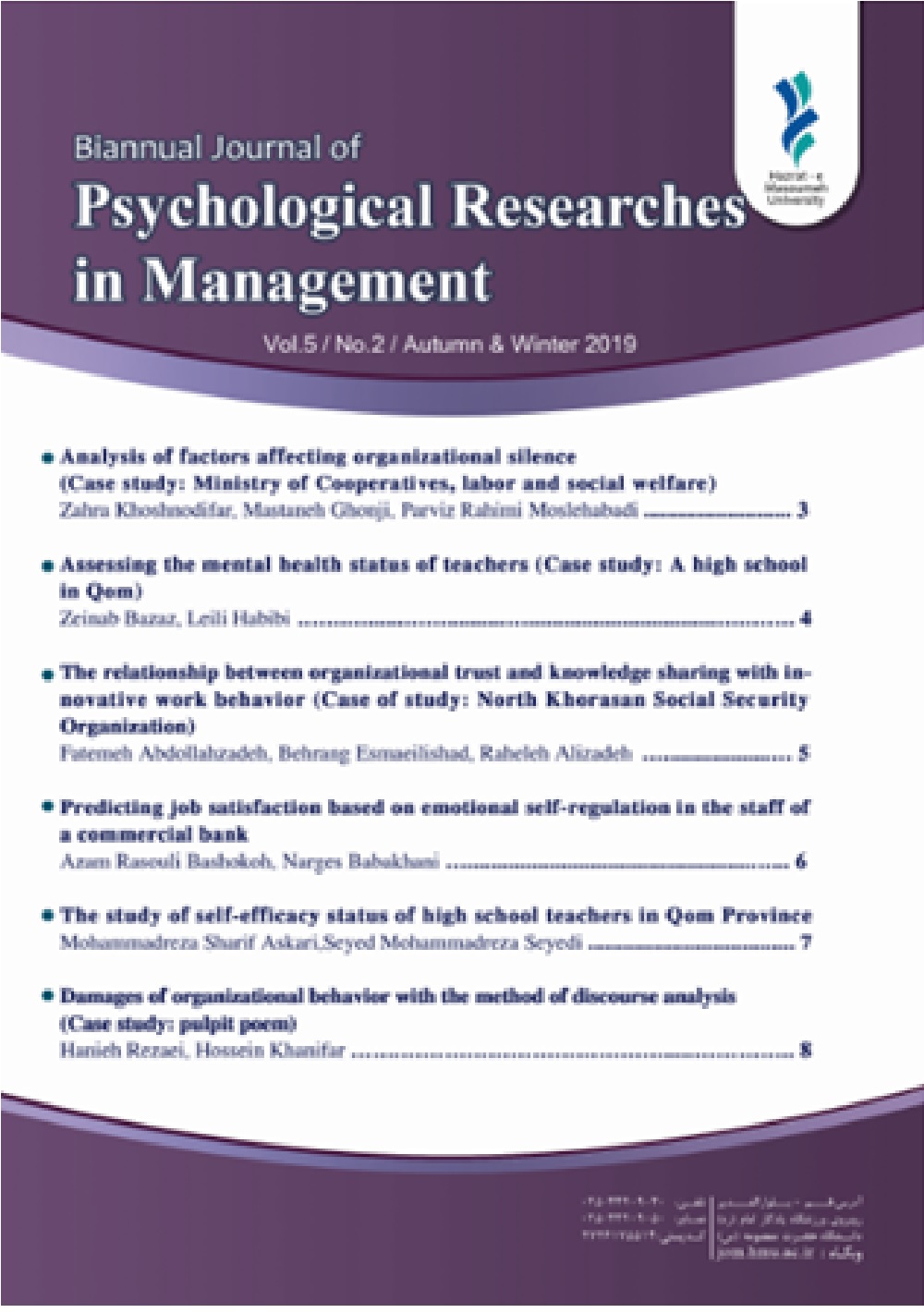Document Type : Original Article
Authors
1 University of Research Sciences
2 Roodehen Azad University
Abstract
In the age of globalization and the rapid advancement of technology, human capital has been regarded as one of the most important assets of organizations. In fact, because the human resources of each organization - as the most important strategic resource in achieving organizational goals - play an important role and are the driving force of the organization, Their perceptions and attitudes to their jobs affect the life, efficiency and effectiveness of the organization. The general attitude of human beings to their work is the object of behavioral phenomena that are termed "job satisfaction" and "job satisfaction" in management books. In fact, job satisfaction is one of the most important factors in job success, as it results in increased job satisfaction and emotional well-being. The findings of organizational and management researchers indicate that in addition to organizational and environmental factors, individual factors also influence job satisfaction, some of which include emotional self-regulation. Therefore, the main purpose of this study was to predict job satisfaction based on emotional self-regulation among commercial Bank staff. The results showed that emotional self-regulation had the high share in predicting job satisfaction.
Keywords
- شفیعی، الهام و رضایی، فاطمه (1395). بررسی رابطه رضایت شغلی و کیفیت زندگی با رضایت از بازنشستگی در کارمندان بازنشسته. فرهنگ مشاوره و رواندرمانی، سال 7، شماره 27، 189-210.
- راستگو، فاطمه و باباخانی، نرگس (1395). ارتباط بین خودتنظیمی هیجانی باکیفیت زندگی در نوجوانان و جوانان همزاد چندتایی. ویژهنامه سومین کنفرانس بینالمللی روانشناسی و علوم تربیتی، 70-465.
- شفیعآبادی، عبداله (1376) راهنمایی و مشاوره شغلی و حرفهای. چاپ 8، رشد.
- خدایاری فرد، محمد و عابدینی، یاسمین (1389). نظریهها و اصول خانوادهدرمانی. تهران: انتشارات دانشگاه تهران.
- طالبی، مریم و غباری بناب، باقر (1391). تعیین رابطه تمایزیافتگی خود، هوش هیجانی و رضایت زناشویی در مراکز مشاوره شهر شاهرود. زن و مطالعات خانواده، سال 5، شماره 18، 32-15.
- دودانگه، سجاد؛ ذاکریان، ابوالفضل؛ دهقانی، محمد؛ قاضیطباطبایی، سید محمود و پیرمند، رضا (1395). رابطه هوش هیجانی و رضایت شغلی کارکنان با استفاده از مدل معادلات ساختاری دریکی از صنایع نفت تهران. بهداشت و ایمنی کار، دوره 6، شماره 1، 43-31.
- اعتباریان، علیاکبر و امیدپناه، علی (1387). هوش هیجانی و رضایت شغلی با یکدیگر همبسته هستند. همچنین، بین دو مؤلفه خودتنظیمی و مهارتهای اجتماعی با رضایت شغلی رابطه وجود دارد. پایگاه مرکز اطلاعات علمی جهاد دانشگاهی، دوره 2، شماره 8، 66-55.
- عیدی، حسین؛ عباسی، همایون؛ بخشی چناری، امین و فدایی، معصومه (1392). پیشبینی رضایتمندی ورزشکاران از طریق هوش هیجانی و مؤلفههای آن. مطالعات روانشناسی ورزشی، شماره 6، 48-37.
- باباخانی، نرگس و رحیمی منجزی، ناهید (1397). پیشبینی رضایت شغلی بر اساس خودتنظیمی هیجانی و مکانیسمهای دفاعی در کارمندان اداره بهزیستی استان تهران. فصلنامه مشاوره شغلی و سازمانی، دوره 10، شماره 24، 98-80.
- محمدی، نسیم و ملک محمدی، محسن (1395). بررسی رابطه هوش هیجانی با وفاداری سازمانی و رضایت شغلی کارکنان مطالعه موردی: اداره کل آموزشوپرورش استان گلستان. کنفرانس بینالمللی نخبگان مدیریت.
- Hülsheger, U. R. Alberts, H. J. Feinholdt, A. & Lang, J. W. (2013). Benefits of mindfulness at work: The role of mindfulness in emotion regulation, emotional exhaustion, and job satisfaction. Journal of Applied Psychology, 98(2), pp. 310.
- Lee, h. Choi, m. Moon, t. (2013). Impact of Self-Regulation on Job Satisfaction and Turnover Intention among Emergency Medical Workers. Researchgate.
- Lee, h. (2017). How emotional intelligence relates to job satisfaction and burnout in public service jobs. International review of administrative.
- Bracket, m. palomera, r. mojsa, j. Reyes, c. (2010). Emotion‐regulation ability, burnout, and job satisfaction among British secondary‐school teachers. psychology in the Schools, 47(4), pp. 406 – 417.
- Jeorge, j, Ealias, a. (2012). Emotional Intelligence and Job Satisfaction: A Correlational Study. Researchgate.
